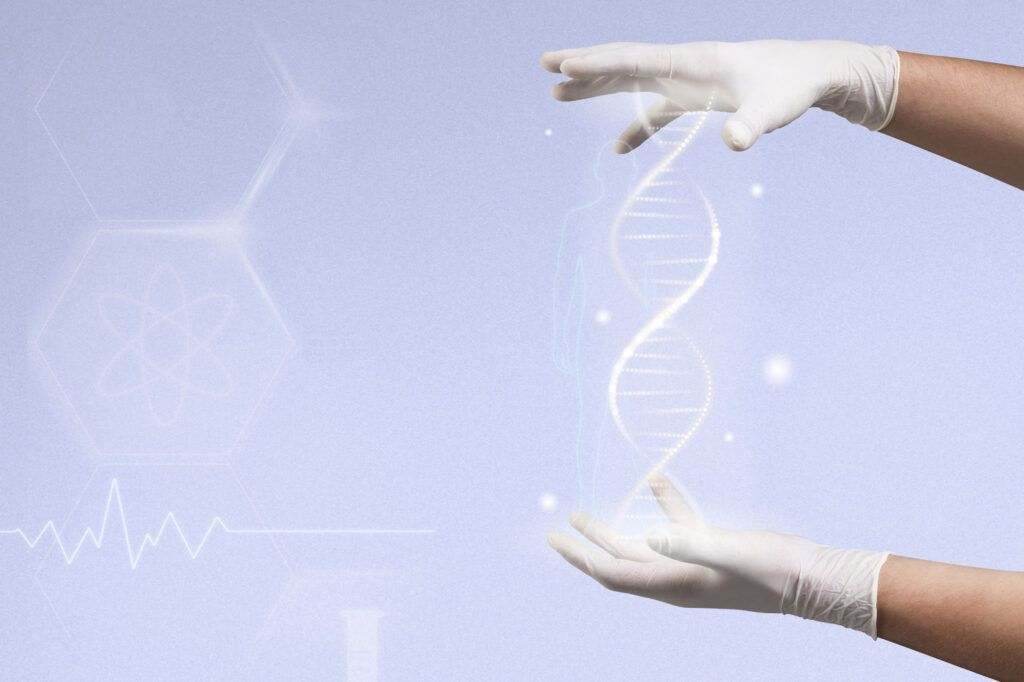Epigenetics Decoded: 5 Ways to Rewrite Your Genetic Destiny
Did you know that your thoughts can influence your genes? Yes, that’s the fascinating science of epigenetics—how your experiences, emotions, and even mindset can directly impact gene expression. While genes may hold your biological blueprint, they aren’t your destiny. The environment you create inside and outside your body—through lifestyle choices, positive thinking, and actions—can switch genes “on” or “off.” You have the power to alter how your body functions, how it heals, and even how it ages. In this article, let’s explore how you can start leveraging this to your advantage.
What is Epigenetics? The Science Behind It
Epigenetics is the study of how external factors—such as lifestyle, environment, and even emotional experiences—can alter gene expression without changing the underlying DNA sequence. While your DNA remains constant throughout your life, the way certain genes are expressed can change depending on your experiences and surroundings. These changes are managed through epigenetic mechanisms, such as DNA methylation and histone modification, which act as “tags” that tell your cells how to read your genes.

Research shows that traumatic experiences, like childhood abuse or chronic stress, can “switch on” certain genes linked to inflammation, stress responses, and even diseases. Studies show that people who experience severe trauma or chronic stress, especially in childhood, are more likely to have altered gene expression that predisposes them to mental and physical health issues.
An Example of Epigenetics at Work
Traumatic events can increase the expression of genes related to inflammation and the stress hormone cortisol, which is associated with anxiety, depression, and immune system dysfunction. Research has demonstrated that adverse childhood experiences leave a genetic mark on genes responsible for stress response. These genes, once activated, can lead to long-term health issues, including cardiovascular disease, diabetes, and even some cancers.

The Silver Lining
However, epigenetics is not a one-way street leading to illness. The exciting potential of this science is that positive lifestyle changes can modify gene expression for better health. For instance, regular exercise, healthy nutrition, mindfulness practices, and even positive thinking can “switch off” harmful gene expressions. By doing so, you can prevent or even reverse the activation of genes linked to chronic diseases. Research has shown that factors like meditation and deep sleep promote the expression of genes that regulate inflammation and immunity.
In essence, while traumatic experiences may predispose you to certain conditions, your genes are not your destiny. Epigenetics reveals that you have the power to influence your health by creating an environment that encourages positive gene expression. Simple lifestyle changes – such as eating nutritious food, managing stress, sleeping well, and fostering emotional well-being – can shift your genetic expression toward health and longevity.

How Positive Thinking Impacts Your Genes
Your thoughts are incredibly powerful, not just in shaping your mood but also in influencing your physical health. When you nurture positive emotions like joy, gratitude, and optimism, you can actually upregulate genes that promote healing, longevity, and a healthier immune system. It’s incredible how something as simple as practicing gratitude can activate genes that foster cell repair and improve overall well-being.

The Impact of Negative Emotions
On the flip side, negative emotions like fear, anger, and sadness can upregulate genes linked to inflammation and disease. This is because stress hormones like cortisol get elevated when we hold onto negative thoughts, affecting everything from our blood chemistry to our immune response. Chronic stress has been shown to weaken the immune system, delay healing, and increase the risk of chronic diseases like cardiovascular issues.
Thoughts Create Your Reality
It’s important to understand that your thoughts act as a powerful environmental factor in your body. Think of your genes like seeds in a garden, and your mindset is the environment that nurtures them. Positive thinking, mindfulness, and gratitude act like sunshine and water, helping the “good” seeds flourish, while negativity and stress create a toxic environment where disease can take root. By simply shifting your thoughts, you can encourage your body’s natural healing mechanisms, reduce inflammation, and promote nervous system repair.

The Role of Lifestyle in Epigenetics: Sleep, Nutrition, and Movement
How your lifestyle decisions influence your genes. Every time you sleep, eat, or move, you’re talking to your genes, telling them how to behave. Epigenetics shows us that while we might inherit certain genes, how they express – whether they stay dormant or become active – is influenced by how we live.
Quality Sleep
Let’s start with sleep. One night of bad sleep can trigger the worst in your genes. It might sound harsh, but think about it – after a poor night’s rest, you wake up feeling off, bloated, irritable, and not yourself. That’s because sleep impacts everything from your metabolism to inflammation levels. But here’s the good news: when you get deep, restful sleep, you’re allowing your body to switch on those “good” genes. Genes that promote healing, recovery, and even better mental clarity. Sleep is like pressing the reset button, giving your cells time to repair and recalibrate.
Deep Cellular Nutrition
Every meal you eat is a signal to your genes. Foods like berries, greens, fatty fish – these are nature’s way of supporting the genes responsible for fighting inflammation, repairing damage, and boosting your immune system. On the flip side, processed junk food filled with sugars and unhealthy fats tells your genes to crank up inflammation, hold onto fat, and even mess with your mental health. The food you eat is information, and your genes are always listening.
Adequate Movement
Physical activity doesn’t just strengthen muscles; it’s a conversation with your genes, telling them to work on metabolism, muscle repair, and immunity. Even a simple walk can shift your genes into action, helping to regulate blood sugar, promote cardiovascular health, and increase energy levels. When you make movement a daily practice, you’re actively shaping your genetic expression in a positive way.
External Factors
Don’t underestimate how your external environment – like relationships and workspaces – affects your internal health. If you’re constantly in toxic surroundings, your body responds by activating harmful genes linked to stress, inflammation, and disease. But when you surround yourself with positivity and support, your genes respond in kind, working for you rather than against you.
The way you live speaks to your genes every single day. Make sure the messages you’re sending promote healing, longevity, and balance.

Actionable Hacks to Positively Influence Your Genes
- Thought Control: Your thoughts are incredibly powerful in influencing your genes. Mindfulness is key here. As I mentioned earlier, it’s not about pretending everything is okay when it’s not. Feel your emotions, but don’t let them control you. The moment you recognize a negative thought, try to shift your focus to something positive. Even a simple change in perspective can turn off genes related to stress and inflammation.
- Positive Self-Talk: The way you speak to yourself has a direct impact on your health. Positive affirmations, saying kind words to yourself, and shifting away from negative self-talk reduce cortisol levels and positively impact your blood chemistry. Over time, this kind of self-talk can influence gene expression, switching on the ones linked to healing, vitality, and longevity.
- Build Uplifting Social Connections: Who you surround yourself with matters. Real friends uplift you, encourage you, and positively affect your internal environment. Uplifting relationships can enhance gene expression related to mood, immunity, and even longevity. On the other hand, toxic environments – be it relationships or workplaces – can upregulate harmful genes. Be intentional about who you allow into your life.
- Daily Habits: Establishing simple habits like getting sunlight in the morning, practicing breathwork, or doing a few stretches can create a positive ripple effect on your genes. These small habits speak to your genes, enhancing functions like metabolism, immunity, and stress response. The key is consistency – daily practice makes a big difference.
- Sleep Hygiene: Good sleep is non-negotiable. Poor sleep can wreak havoc on your genes, promoting inflammation and reducing cognitive function. Use blue light blockers before bed, create a cold, dark sleeping environment, and avoid screens an hour before you sleep. These simple practices allow your genes to activate repair and recovery processes, setting the stage for better health.
Final Word
The power to change your life lies within you, and that starts with how you think, how you feel, and the choices you make each day. Epigenetics shows us that our genes are not our destiny – they are influenced by our actions, our environment, and even our thoughts. So, why not take control? Your positive thoughts, mindful practices, and daily habits have the ability to unlock better health, resilience, and vitality. Every choice, every moment of self-care, and every uplifting connection helps rewrite your genetic story. The question now is: what outcome will you choose to create for yourself?
Ready to take the first step towards self-mastery?
Start small, with one manageable change today.
Know more about our book, Small Wins Everyday.
Set up a one-on-one consultation with our integrative team by reaching out to us at
1800 102 0253 or write to us at consults@lukecoutinho.com.
Disclaimer: Always make an informed choice. Keep your healthcare provider in the loop before trying anything new, especially if you are going through a medical condition or are on medications.
|
From a pimple to cancer, our You Care Wellness Program helps you find a way Talk to our integrative team of experts today 18001020253 |










Leave a Reply